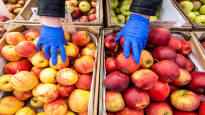According to customs, residues are often found in apples, pears, peaches, strawberries and peppers and celery imported to Finland. The substances mentioned in the report are permitted in the EU, although they should be replaced by less toxic ones.
Fresh fruit produced in the EU contains significantly more residues of harmful pesticides than it did about a decade ago, according to a recent study.
The report analyzed samples from EU authorities: almost 100,000 fruit samples and just over 113,000 vegetable samples during the follow-up period.
In 2019, at least two different substances classified as hazardous were found in almost a third of all fruit samples.
– Consumers are now in a terrible situation. They are encouraged to eat fresh fruit, much of which is contaminated with toxic pesticide residues with serious health effects, PAN Europe spokesman Salomé Roynel says The Guardian (going to another service) by.
The dangerous substances listed in the report are on the list of so-called candidates for substitution. An EU Member State has been required to replace hazardous substances with less hazardous ones since 2011.
Some of the substances have been linked to the risk of developing cancers, heart problems and other serious illnesses, according to the news agency AP.
The report focuses in particular on the countries with the highest residues in fruit and vegetables.
These fruits have the most residues
The report also highlights individual producer countries. For example, 87% of Belgian and 85% of Portuguese pears were found in 2019. They were also found in 74% of Spanish cherries and 85% of Italian celery.
The numbers have also increased. Residues found in all kiwi samples increased by 28 percentage points in nine years and in cherries by 28 percentage points.
In addition to the above, residues were also found in peaches, strawberries and apricots.
Vegetables are less susceptible to insects and diseases, so the measured concentrations were lower.
According to the report, Belgium is the country with the highest production of fruit and vegetables. Ireland, France, Italy and Germany are next. Of all of these, residues were found in more than one-fifth of the products during the follow-up period, and even more than one-third in Belgium.
Residues in fruit imported into Finland
Residues of harmful pesticides are found in fruits and vegetables imported to Finland, says Customs pilot of food research Suvi Ojanperä.
– The substances found in the report are found very often, these were very familiar, Ojanperä says in a telephone interview.
According to Ojanperä, residues can be found, for example, in apples, pears, peaches, strawberries and peppers and celery imported to Finland.
Products are generally not discarded as the concentrations measured in them do not exceed the permitted levels.
Ojanperä points out that the substances mentioned in the report are still approved for use, although it is hoped that they will be replaced by a less harmful substance.
Customs rejects batches of products that contain completely banned pesticides.
– These often come from third countries and there are quite a few rejections from Egypt and Asian countries, for example.
According to Ojanperä, these substances are not included in the report.
According to Ojanperä, the number of product batches containing prohibited substances has been growing in recent years. According to Ojanperä, Customs does not have similar data regarding the pesticides mentioned in the report.
According to the EU, the numbers are falling, the report denies this
According to a report from PAN Europe, this is not the case and use has increased.
The safety of pesticides in the EU is assessed about every 10 years, says the chief inspector Tiia Mäkinen-Töykkä Safety and Chemicals Agency Tukesilta by e-mail.
According to him, for several active substances mentioned in the report, the first approval is about to expire in the near future, for some already this year.
The products are evaluated in collaboration with the EU and approved nationally.
Mäkinen-Töykkä says that only substances that do not cause unreasonable harm to health and the environment are approved for use.
According to the site, agricultural organizations favoring pesticides have been lobbying strongly and taking advantage of the current geopolitical situation in the EU.
You can discuss 1.6. until 11 p.m.
